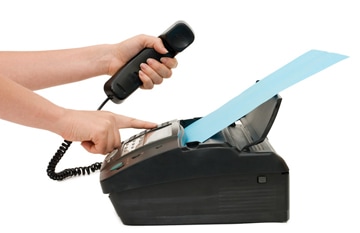Among the many advantages highlighted for the electronic medical record are the ability to share these documents across multiple providers and healthcare systems, and the ensured ease of medical record retrieval. However, many providers still rely on outdated technology such as the fax machine when it comes to sharing medical records. This is discussed in an interesting article in www.vox.com. Citing an Arlington medical center, the article focuses on the challenges providers face with electronic medical records. The particular clinic referred to has digitized their patient data, but the problem is that their electronic system cannot connect with other clinics’ records. And the result? When doctors want to retrieve medical records from another office, they have to depend on fax. In fact, EHR systems used by different departments in the same health center also often do not connect, which necessitates printing out pages of one record, faxing it, and then scanning those pages into the other digital system. In this medical center, they have a medical records department that goes through all the incoming faxes, sorts them for each doctor, and stores the results in a folder. This is a problem quite common throughout the country, which can be attributed to the EHR systems’ inability to “talk” to each other.
The Fax Machine a Fixture in Healthcare Settings
The lack of interoperability of electronic health records is not the only reason why the healthcare industry continues to use fax machines. These devices are used to share notes across doctors’ offices and facilities, transmitting prescriptions to pharmacies, processing and adjudicating claims and billing information, transmitting radiology and pathology results, and registering new patients. A National Physicians Survey results showed that fax is still the dominant method physicians use to communicate with colleagues, patients, pharmacists, and insurance companies. 63% of healthcare providers rely on fax, according to MMRGlobal. MMRGlobal’s CEO says fax technologies are integrated now into the most advanced EMR systems because that is the standard the majority of physicians still want to use. Here are some other advantages cited.
- The security feature of fax technology helps ensure patients’ privacy
- The capability of sending authorized signatures helps speed up services
- The ease of sending images gives doctors another medium to help carry out their jobs
- It is a file format that is compatible with the phone network
- Online faxing allows doctors to use their mobile phone’s camera as a fax machine. A document can be faxed easily by taking a photo of it with a camera phone.
- Online faxing allows doctors to sign documents, STAT. They can effortlessly sign urgent, time-sensitive documents using a digitized signature on an online fax, all the time maintaining HIPAA compliance.
Shortcomings of Fax
However, votaries of digitization point out the shortcomings of fax technology.
- While fax machines enable transmission of information, the data may not be immediately usable or actionable. Important data could be lost among piles of less important information.
- Faxes are not searchable documents.
- Faxes can be easily lost.
- As a format, fax is not private or secure because in most healthcare settings the machine is open and accessible to a number of individuals.
- Fax machines employ an optical format that makes the use or analysis of transmitted information difficult.
Most industries discarded the fax machine by the 1990s mainly because of their disadvantages. Interference of busy signals, faxes going to the wrong place and blurry printouts are among the major problems. However, the healthcare industry remains as an exception. It is estimated that around 75% of all medical communication is in fax. Though the Obama administration succeeded in persuading American hospitals and doctor offices to switch from paper to electronic medical records, they failed to account for the very important requirement, namely, sharing. Providers and health systems that are unable to transfer medical information among themselves continue to rely on printing out the medical documents and faxing them.
The “Sharing” Issue
A question arises, are providers unwilling to share patient health data? Observers point out that there may be strong economic incentives for healthcare providers to keep patient data to themselves. When a medical record is shared, it makes it easier for the patient to see a different doctor. This is something healthcare entities don’t want to happen because it would entail losing patients to a competitor. Then there are the EHR vendors that don’t have much incentive to connect well with other electronic record systems. They would rather bring to their fold hospitals that are on a different electronic platform. If they choose to develop EHR systems that enabled anyone to plug into any other system, it would reduce the advantage of staying on their particular network. What about the physicians? Many physicians are still worried about transferring sensitive PHI – whether encryption works, whether password protection will stay intact, and so on.
A National Database Is Beneficial
There is no denying the fact that a comprehensive national database of health records provides numerous advantages. Better designed electronic records can enable easy and smooth transfer of data from one system to another. To ensure confidentiality of PHI when requesting and using medical records for medical chart reviews and other purposes, the government can bring in effective legislation. A population-wide medical database can definitely improve the provision of healthcare. Such a system will help patients move safely and seamlessly across diverse healthcare settings. If there is an emergency, access to critical information in the database can also save lives. Interoperable electronic health records facilitate medical record retrieval and enable physicians to more effectively monitor their patients’ care as well as evaluate, audit, and improve the quality of care. Reliable EMR systems can identify gaps in healthcare and help patients address them. Health information technology opens up numerous possibilities, and therefore it is high time that healthcare providers take a conscious effort to reduce the use of outdated technology and embrace innovative solutions.




